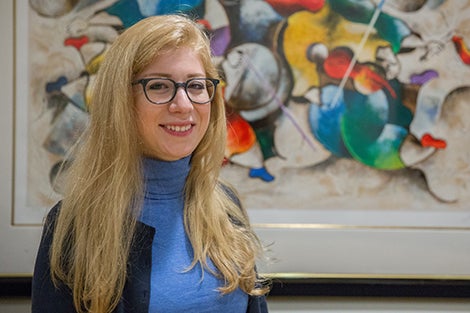Student plans on returning home to Syria to practice science, influence health care policy
May 10, 2016 — Lana Awad didn’t know until she was in ninth grade that she was visually impaired because of a genetic disorder. She knew that, even with glasses, her vision was poor. But it was only after skipping ahead in her biology textbook one day that she read, by chance, about a genetic disorder that harms vision and realized it was the same condition she had.
No one had talked much about Awad’s condition when she was growing up—first in Syria, then in Saudi Arabia—because, “in the Middle East, there is a huge social stigma against disabilities,” she said.
Spurred by wanting to understand more about her own condition and about genetics in general, Awad came to the U.S. in 2007 to study at the Massachusetts Institute of Technology, where she earned a bioengineering degree. After a three-year consulting stint working on statistics for clinical trials, she enrolled at Harvard T.H. Chan School of Public Health and will graduate in May with a master’s in computational biology and quantitative genetics.
A backdrop of war
The situation in Syria has never been far from Awad’s mind. At the time war broke out in 2011, Awad’s immediate family had already relocated to Saudi Arabia for economic reasons. Her extended family remained in Syria. They all used to live in Homs, one of the cities hardest hit by the war, but bombings and shellings have driven almost all of them from the city. A few younger relatives escaped Syria by boat—they are now in Germany, Denmark, and Canada—and the rest relocated within the country, to the mountains in the west where there is currently no fighting.
“Some cities are in dire disaster; in others, life is relatively normal,” Awad said. Her family, part of the Christian minority, is safe for now, “but it’s a pretty unpredictable conflict, so you never know,” she said.
Over the past few years, Awad’s parents have returned to Syria once a year to help take care of her grandmother. In the past, Awad visited at the same time. However, she has not been able to return to Syria since 2010, shortly before the war started.
Science with a side of policy
For the immediate future, Awad hopes to gain work experience in the U.S. She’s interested in biotech startups that use computational methods to facilitate diagnosis, such as those that screen for mutations in tumor samples or for microorganisms in blood or stool samples. She’s also interested in companies that use clinical and lifestyle data to detect warning signs for health problems.
Eventually, she plans to return to Syria—“the only question is when,” she said. Given war-related damage, it could be years before Syria has adequate facilities for lab research, so she decided to focus her studies at Harvard Chan School on computational biology—which requires only a computer. “In this way I will be able to work from anywhere because I don’t need to rely on infrastructure,” she said.
In the School’s computational biology and quantitative genetics program, Awad has been learning how to analyze and manage large-scale public health data—“big data”—in biomedical research, and has also studied statistics and epidemiology. In the lab of Curtis Huttenhower, associate professor of computational biology and bioinformatics, she has worked on computational methods to predict the functions of unknown genes in the vast human microbiome—the millions of microbial genes that live inside the human body.
Awad has appreciated Harvard Chan School’s efforts to accommodate her visual impairment. Professors have made sure to provide her with PDFs or printouts of their presentations, and she’s been given extra time to finish exams. “The School has been very helpful,” she said.
She has also taken advantage of Harvard Chan’s strength in health policy. Part of why she chose to attend the School is because she thinks policy know-how will be valuable in any future work she does to help Syria as it begins the Herculean task of rebuilding. “When I return home, I would like to work in the fields of genetics and computational biology, but I also want to help build Syria’s capacity for biological research and address health disparities—and that has to do with policy,” she said.
For Awad, one key policy take-away she learned is that it’s important to have good negotiating skills. “For example, I learned that even if you try to provide a country or group with a particular medical service—for free—they might not take it because it’s something they’re not used to,” she said. “In a case like this, negotiation skills could be crucial.”
Home front
Awad has been trying to help her home country, even if remotely. For example, she has worked with a nongovernmental organization called Jusoor Syria that supports education for Syrian children living in refugee camps as well as students wishing to study at universities abroad. Using contacts she made while serving as president of MIT’s International Students Association in 2009-10, Awad helped drum up interest among Syrian college and university students in the U.S. and elsewhere to attend the organization’s first annual conference in New York in 2012, and to support its work.
Although Awad doesn’t know when she’ll be able to return to Syria, she does know that, someday, she wants to help improve the country’s health care system—and topping her list right now is mental health. “Considering the years of war, that’s going to be a priority,” she said. She knows, though, that other things will have to come first—like ensuring there’s enough clean water and more than a few hours of electricity each day. “We’ll have to rebuild for the basics,” she said. “I believe that, even after all the horrible things that have happened in Syria, the willingness to improve—and to change the country for the better—is still there.”
photo: Sarah Sholes
